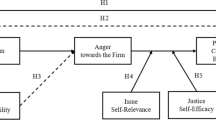Abstract.
This study measures social desirability bias (SD bias) by comparing the level of discipline sales managers believe they would administer when supervising unethical selling behavior with the level of discipline they perceive other sales managers would select. Results indicate the presence of SD bias; the sales manager respondents consistently claimed that they would be stricter while their peers would be more lenient. Using an analytical technique that takes social desirability bias into account, it appears that sales managers’ use of discipline is affected by the sales performance of the salesperson being disciplined resulting in more lenient discipline for top sales performers. In addition, the more lenient treatment for top sales performers persists even when there is a pattern of a prior ethical infraction and the existence of an explicit organizational policy proscribing the act in question. Sales managers believe that, like themselves, others would be stricter when an unethical act is committed for the second time but not as strict as they personally would be. A within-subjects interaction effect indicates more SD bias under the condition of the unethical act being committed for the second time.
Similar content being viewed by others
References
J. S. Armstrong T. Overton (1977) ArticleTitleEstimating Nonresponse Bias in Mail Surveys Journal of Marketing Research 14 (August) 396–402
J. A. Bellizzi J. A. Hite (1989) ArticleTitleSupervising Unethical Salesforce Behavior Journal of Marketing 53 (April) 36–47
J. A. Bellizzi R. W. Hasty (1998) ArticleTitleTerritory Assignment Decisions and Supervising Unethical Selling Behavior: The Effects of Obesity and Gender as Moderated by Job Related Factors Journal of Personal Selling and Sales Management 18 (Spring) 35–49
J. A. Bellizzi R. W. Hasty (2003) ArticleTitleSupervising Unethical Sales Force Behavior: How Strong is the Tendency to Treat Top Sales Performers Leniently’? Journal of Business Ethics 43 (April) 337–351
J. Chung G. S. Monroe (2003) ArticleTitleExploring SD Bias Journal of Business Ethics 44 (June) 291–302
J. R. Cohen L. W. Pant D. J. Sharp (2001) ArticleTitleAn Examination of Differences in Ethical Decision-Making between Canadian Business Students and Accounting Professionals Journal of Business Ethics 30 (April) 319–336
J. R. Cohen L. W. Pant D. J. Sharp (1998) ArticleTitleThe Effect of Gender and Academic Discipline Diversity on the Ethical Evaluations, Ethical Intentions and Ethical Orientation Of Potential Public Accounting Recruits Accounting Horizons 12 (September) 250–270
M. F. Fernandes D. M. Randall (1992) ArticleTitleThe Nature of SD Response Effects in Ethics Research Business Ethics Quarterly 2 IssueID2 183–205
G. V. Glass J. C. Stanley (1970) Statistical Methods in Education and Psychology Prentice-Hall Englewood Cliffs
F. Hansen (1972) Consumer Choice Behavior The Free Press New York
W. H. Hegarty H. P. Sims (1979) ArticleTitleOrganizational Philosophy, Policies, and Objectives Related to Unethical Decision Behavior: A Laboratory Experiment Journal of Applied Psychology 64 IssueID3 331–338
S. D. Hunt A. Z. Vasquez-Parraga (1993) ArticleTitleOrganizational Consequences, Marketing Ethics, and Salesforce Supervision Journal of Marketing Research 30 (February) 78–90
S. D. Hunt S. Vitell (1986) ArticleTitleA General Theory of Marketing Ethics Journal of Macromarketing 6 (Spring) 5–16
H. H. Kelley (1967) Attribution in Social Psychology D. Levine (Eds) Nebraska Symposium on Motivation, Vol. 15. University of Nebraska Press Lincoln 192–238
M. Marchetti (1996) ArticleTitleWomen’s Movement Sales and Marketing Management 148 (November) 76–82
T. R. Mitchell S. G. Green R. E. Wood (1981) An Attributional Model of Leadership and the Poor Performing Subordinate: Development and Validation L. L. Cummings B. M. Staw (Eds) Research in Organizational Behavior , Vol. 3 JAI Press Greenwich, CT 197–234
W. J. Stanton R. Spiro (1999) Management of the Sales Force Irwin McGraw-Hill New York
P. P. Schoderbek S. P. Deshpande (1996) ArticleTitleImpression Management, Overclaiming, and Perceived Unethical Conduct: The Role of Male and Female Managers Journal of Business Ethics 15 (April) 409–414
E. Strout (2002) ArticleTitleTo Tell the Truth Sales and Marketing Management 154 (July) 40–47
Author information
Authors and Affiliations
Corresponding author
Rights and permissions
About this article
Cite this article
Bellizzi, J.A., Bristol, T. Supervising the Unethical Selling Behavior of Top Sales Performers: Assessing the Impact of Social Desirability Bias. J Bus Ethics 57, 377–388 (2005). https://doi.org/10.1007/s10551-004-6589-9
Accepted:
Issue Date:
DOI: https://doi.org/10.1007/s10551-004-6589-9




